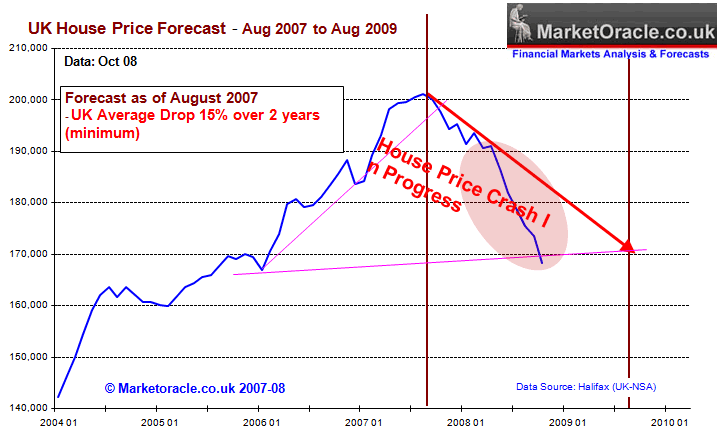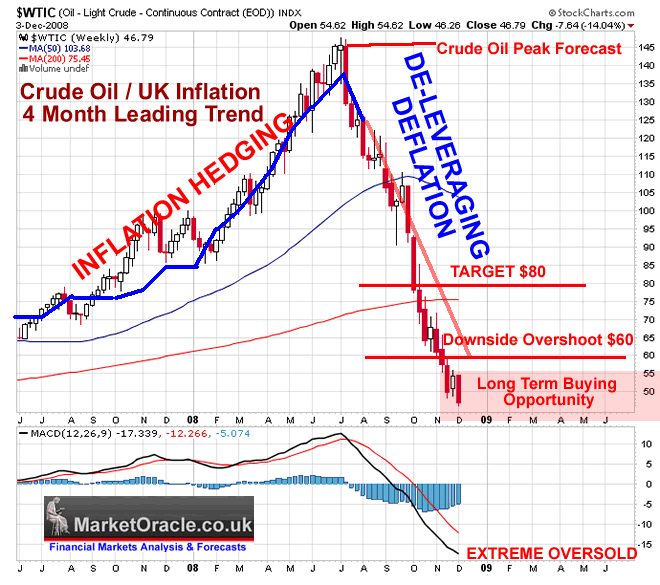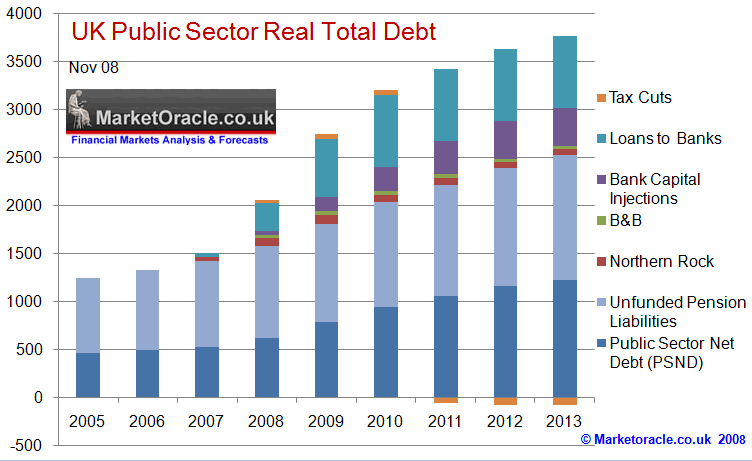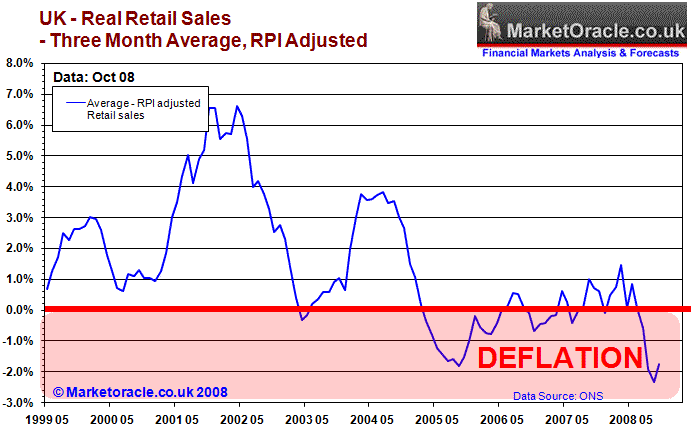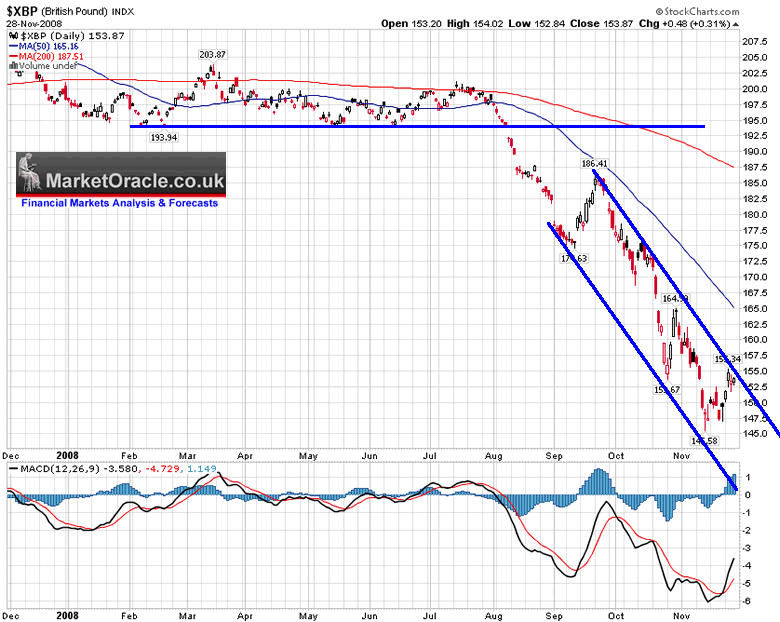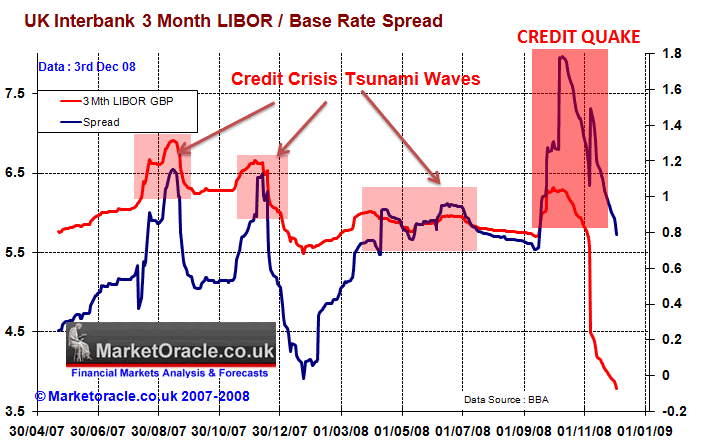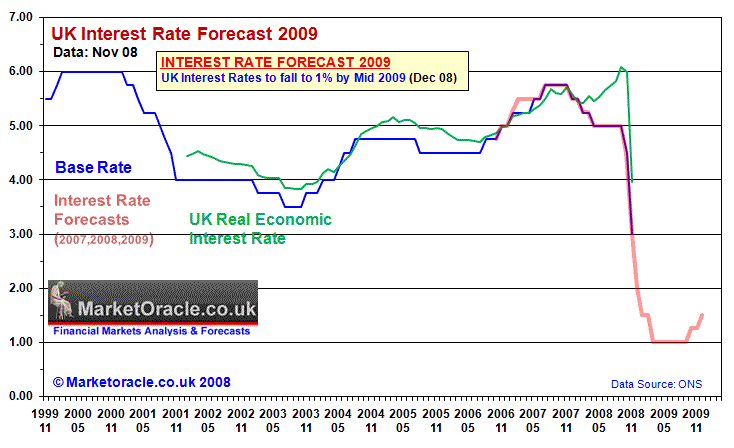UK Interest Rate Forecast 2009
News_Letter / UK Interest Rates Dec 11, 2008 - 06:35 PM GMTBy: NewsLetter
 December 4th , 2008 Issue #41 Vol. 2
December 4th , 2008 Issue #41 Vol. 2
Gordon Browns government having abandoned all of the fiscal rules that it once prided itself on religiously following, is now hell bent on kick starting the UK economy in advance of the looming May 2010 general election deadline. The steady as she goes economic policy has been replaced by the panicking 'unprecedented action's' economic policy and in that having rested away control of UK interest setting from the Bank of England in all but name, UK interest rates are now set to be the latest to take a crash course towards an unprecedented level of just 1%.
UK Interest Rate Forecast 2009Gordon Browns government having abandoned all of the fiscal rules that it once prided itself on religiously following, is now hell bent on kick starting the UK economy in advance of the looming May 2010 general election deadline. The steady as she goes economic policy has been replaced by the panicking 'unprecedented action's' economic policy and in that having rested away control of UK interest setting from the Bank of England in all but name, UK interest rates are now set to be the latest to take a crash course towards an unprecedented level of just 1%. The Path to the Crash in UK Interest Rates - UK Housing Market Crash of 2007-2008 The housing market started the crash ball rolling as the interbank money markets first froze in August 2007 as financial intuitions were no longer able to accurately price and trade their U.S. subprime mortgage backed securities that led to an increase in the risk of default that soon spread to non subprime related derivatives, to an active derivatives trader this clearly spelled doom for the UK housing and implied an imminent downtrend in house prices, the magnitude of which was originally estimated to be at least at the rate of 7.5% per annum.
At the time the regulator (FSA) and Bank of England and the government failed to take any effective action which resulted in the first banking crash of 2007, when Northern Rock went bust by triggering a humiliating first run on a British bank in some 150 years. There could not have been a clearer confirmation of the end of an era for the British housing and easy money markets, and which suggested that house prices would decline at an even faster rate. The August 07 credit crunch clearly signaled much lower interest rates, with my subsequent forecast of September 2007 targeting UK interest rates to fall to 5% by September 2008 at a time when the majority were still looking for UK interest rates to rise to above 6% (5.75% at the time). However, despite the next few months bringing soothing voices from amongst the vested interests in a stable housing market such as forecasts of no falling house prices during 2008, but rather a soft landing much as transpired during the early years of the 1989-1992 housing bust. House prices confirmed the August peak and continued trending lower at the rate of 7.5% per annum. However the credit crisis continued to intensify as the interbank LIBOR rate leapt to a new credit crisis extreme, still the authorities failed to recognise the extent of the problem in that the banks had hidden the true extent of their growing losses and exposure to the U.S. subprime mortgage market off the banks balance sheets that effectively put them most at risk of insolvency. By November 2007, the growing signs of an impending crash in the UK housing market was anticipated to occur starting in April 2008 to coincide with the Capital Gains tax changes that would induce buy to let speculators making a mad dash for the exit. Finally by December 2007, the Bank of England made its first interest rate cut of 0.25%, whilst at the same time starting to recognise that interbank market was not functioning and started to make short-term loans that were added to for longer-terms later in the year by the UK treasury in April 2008, however by that time it was too late as the housing market crash of 2008 had begun. However after the rate cut of May 2008 to 5%, the Bank of England who's primary goal is to target inflation at 2% CPI, became paralysed by the fear of inflation as CPI inflation busted through the 3% upper boundary all the way to the 5.2% peak in October 2008. The BoE remained paralysed into inaction for the whole period, when the BoE had the opportunity to act it failed to do so, which resulted in an acceleration in the housing market rate of decline to twice the anticipated rate and soon followed by the UK economy falling off the edge of the cliff as an increasingly worried Gordon Brown watched on in horror as his chances of winning the next general election quickly evaporated. It is not as though the BoE did not have any warning that inflation would soon reverse given the peak in Crude Oil in July at $147, which at that time my analysis called for an imminent peak and for oil prices to trend lower towards a target of $80, later with crude oil hovering at $90 my analysis concluded that crude oil would overshoot to the downside towards $60. However despite the peak in Crude oil, the Bank of England did nothing at subsequent meetings to cut interest rates but remained frozen into inaction.
It took emergency action by the Government to effectively rest control of monetary policy away from the BoE by cutting interest rates by 0.5% as announced not by the Bank of England but a day earlier by Gordon Brown at the Prime Ministers Dispatch box, which sent a clear message to the markets that Gordon Brown had now taken over control of monetary policy due to the lack of action by the Bank of England during the preceding 3 months or so. The emergency action did not end there, the dual emergency action also involved an unprecedented £500 billion bank rescue scheme in an attempt at repairing the damage to the Britain's Banking System due to the failure to regulate the banking system that had contributed to bringing the UK financial system to the brink of collapse. The October 0.5% rate cut was later followed by the panic 1.5% rate cut in November as the Bank of England played catchup in attempt to repair the damage done as a consequence of inaction during the preceding months. UK Housing Market, Inflation and Debt Forecasting Uncertainty The consequences of the systemic mismanagement of UK financial system is that the ever escalating measures taken to turn the economy around will prove highly costly to Britain for many years in terms of loss of real value of asset values and disposable incomes as the debt burden and liabilities soar to beyond £3.2 trillions. This also creates a great deal of uncertainty and difficulty in generating forecasts, because it is not unknown to what extent the governments liabilities will actually grow to. The recent analysis - Bankrupt Britain Trending Towards Hyper-Inflation? , highlighted the dangers that the banking sector posed to the UK economy with the risks that should a wholesale nationalisation of the banks be required then that would lift total liabilities to the British tax payer by £5 trillion, in comparison to the £500 billion of official public sector net debt outstanding at the end of 2007. This extra liability would be on top of the deficit spending and borrowing binge that the government announced in the emergency budget and thus risked bankrupting Britain which would be manifested in a collapse in the currency and thus the inability of Britain to service debt denominated in foreign currencies. For the updated housing market forecast covering the next 2-3 years subscribe to our free newsletter.
UK Economic Contraction and Deflation The UK economy is expected to contract by at least 3% for the period to the end 2009. This contraction coupled with the slump in asset prices is highly deflationary and expected to lead to a sharp fall in the rate of UK inflation into Mid 2009. However deflation will be short lived and my expectations are for a V shaped bottom and for inflation to resume and trend towards 2% CPI by early 2010, which suggests ultra low interest rates will not stay around for long and follow inflation higher by the end of 2009. Whilst deflation has yet to show in the inflation statistics, however it is apparent in the retail sales trend and inflation adjusted data which illustrates a slump in retail sales activity that is contracting at the rate of -1.8% year on year and reflects the actual state of the retail sales market. This trend is expected to continue deteriorating for the duration of the recession as more retailers report losses and in fact go out of business.
British Pound Inflationary Crash Sterling has already fallen by 30% against the US dollar, this means goods in the shops are 30% cheaper for Americans, and 22% cheaper for Europeans, this disparity is not going to hold for much longer especially as my long range forecast is for sterling to trend down towards the £/$137.50 multi decade support level which may give temporary respite to the sterling bear market. However a break below £/$137.50 would target parity to the US Dollar, which will mean a further loss of value of 35% in the value of all assets and 53% loss of value for the duration of the bear market to parity and likewise a large rise in the price of dollar imported commodities, goods and services and to a lesser degree from other countries, therefore highly inflationary. Therefore this confirms that goods in the shops won't remain cheap for long and thus shoppers should take the opportunity to buy now as the price for filling shop stocks later in 2009 will be significantly higher.
LIBOR
The LIBOR interbank rate continues to ease from credit quake extremes, bringing the spread between the base rate and the LIBOR rate to below 1% and on target to achieve the pre-credit crisis spread rate of less than 0.75% above the base rate. However a rate cut today will temporarily lead to a widening in the LIBOR spread as the market will take some weeks to adjust to the rate cut. UK Interest Rate Forecast The race is on to keep cutting UK interest rates towards ZERO before inflation takes off. However as I pointed out earlier the UK government has the advantage for at least another 6 months due to the extent of economic contraction and the expectations for a sharp fall in inflation which projects to significantly below the 2% target rate, and in fact the RPI measure may even go negative next year i.e. real deflation. This gives the Bank of England ample time and scope to make further deep interest rate cuts. However the clear signal from the government is take the action now, rather than later so the pattern of drip, drip rate cuts that had been the norm up until November is now no longer official monetary policy. The policy now is to shock the UK economy into a turnaround, for the sooner the economy bounces back the sooner the general election will be called. Therefore there is a high probability that UK interest rates will be cut by 1% later today to take UK interest rates down to 2%, which will be a brief marker enroute towards taking interest rates to possibly below 1%, though probably making a low at 1% by early next year and staying there for some months as the below graph illustrates.
Savers Pay the Price Today's base rate cut to perhaps 2% would leave typical better paying instant savings accounts in the region of 2.5% to 3%, whilst above the base rate these are still a good 1.5% to 2% below the current inflation rate of 4.5% and therefore savers are losing as much as 2% of the value of their savings in real terms and therefore savers are paying the ultimate price for the credit crisis bailouts and government debt fuelled electioneering spending spree. This is even more so when the 20% to 30% currency crash is taken into account which has wiped away significant purchasing power of the British Pound in everyone's pocket. The ultimate outcome is for the exploding debt burden to ensure stagflation for many years following the deflation of 2009. The Credit Crisis Survival Kit Elliott Wave International, the world's largest market forecasting firm, put together this free resource featuring 15 hand-picked reports and videos that will show you:
Read All 15 and Download Your Free Credit Crisis Survival Kit Your analyst, Nadeem Walayat Copyright © 2005-08 Marketoracle.co.uk (Market Oracle Ltd). All rights reserved. Nadeem Walayat has over 20 years experience of trading derivatives, portfolio management and analysing the financial markets, including one of few who both anticipated and Beat the 1987 Crash. Nadeem's forward looking analysis specialises on the housing market and interest rates. Nadeem is the Editor of The Market Oracle, a FREE Daily Financial Markets Analysis & Forecasting online publication. We present in-depth analysis from over 150 experienced analysts on a range of views of the probable direction of the financial markets. Thus enabling our readers to arrive at an informed opinion on future market direction. http://www.marketoracle.co.uk Disclaimer: The above is a matter of opinion provided for general information purposes only and is not intended as investment advice. Information and analysis above are derived from sources and utilising methods believed to be reliable, but we cannot accept responsibility for any trading losses you may incur as a result of this analysis. Individuals should consult with their personal financial advisors before engaging in any trading activities. Attention Editors and Publishers! - You have permission to republish THIS article. Republished articles must include attribution to the author and links back to the http://www.marketoracle.co.uk . Please send an email to republish@marketoracle.co.uk, to include a link to the published article. For more in depth analysis on the financial markets make sure to visit the Market Oracle on a regular basis.
You're receiving this Email because you've registered with our website. How to Subscribe Click here to register and get our FREE Newsletter Forward a Message to Someone [FORWARD] To update your preferences and access the Newsletter archive [PREFERENCES] How to Unsubscribe - [UNSUBSCRIBE]
|
|||||||||||||
© 2005-2022 http://www.MarketOracle.co.uk - The Market Oracle is a FREE Daily Financial Markets Analysis & Forecasting online publication.



